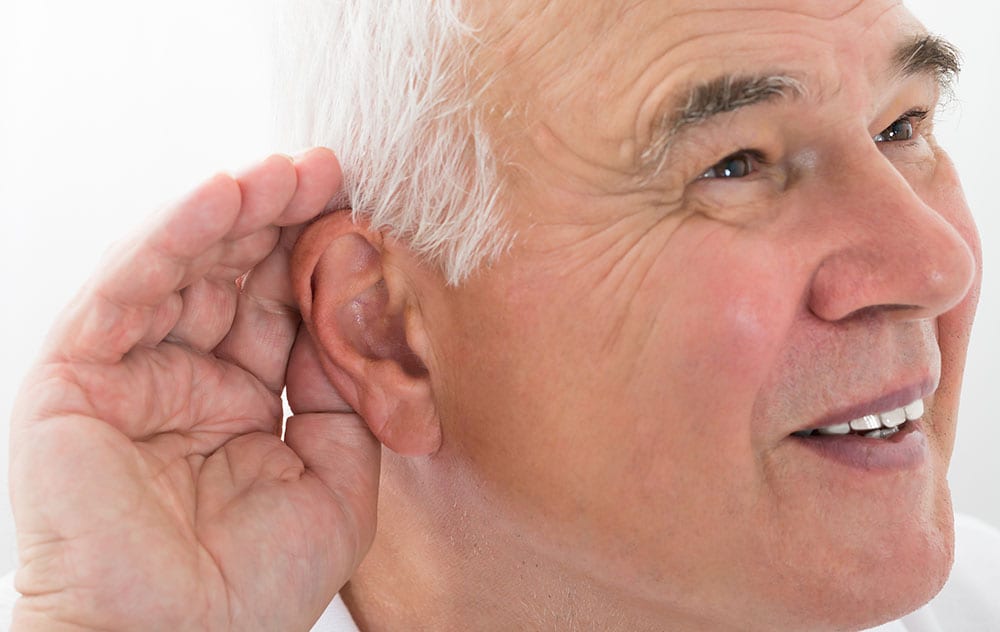
Age-related hearing loss affects a large number of adults. It occurs when the hair cells in the inner ear naturally break down due to the aging process. Sound can still reach the inner ear, but the lack of hair cells means that signal has a hard time reaching the brain. This is also known as presbycusis and often affects older adults.
Age-related hearing loss can be difficult to recognize when you’re experiencing it yourself, which is why it’s critical to identify the signs. The most common indications that you’re developing presbycusis, include:
- Speech sounding slurred or murmured
- Difficulty hearing high-pitch sounds
- Problems hearing small children or women
- Difficulty hearing conversation when background noise is present.
- Challenges talking on the phone
- Relying on facial features and lip reading to understand the message.
Surprisingly, only around 20% of individuals that experience age-related hearing loss actually seek help. This leaves a large portion of people with hearing loss and no potential treatment options or solutions.
Age-related hearing loss happens slowly
One of the biggest issues with age-related hearing loss is that it happens so gradually that we often can’t tell if we’re experiencing hearing loss. In fact, some of the most common ways to tell if you have hearing loss are to rely on the comments of other people. For instance, a relative or friend might comment on your loud television or the volume that you listen to music at.
There are also signs that you might be able to detect on your own. For example, you might be experiencing hearing loss if you find it difficult to hear conversations when there’s a lot of background noise or if certain sounds are muffled and hard to distinguish.
If you think you may be experiencing some kind of hearing loss, we urge you to get in touch with our experts at Albuquerque Hearing and Balance. The only way to truly tell if you’re facing hearing loss is to speak with a trained audiologist that can help you measure your hearing levels. This will give you a definitive answer whether you have hearing loss or not, and your audiologist will also give you some advice and propose solutions to help you restore your hearing.
How does age-related hearing loss impact those that it affects?
Age-related hearing loss can affect us in many ways, which is why it’s incredibly important to seek treatment:
- Negative social impact such as feeling isolated or embarrassed in social situations.
- Potential health effects such as headaches, muscle tension and stress.
- Withdrawal from social situations could lead to depression and anxiety.
- Hearing loss can also affect your balance, leading to dizziness and difficulty walking.
- These effects can also reduce your productivity at work.
Age-related hearing loss can be difficult to cope with, especially if you haven’t spoken with an audiologist yet. There are many people that experience age-related hearing loss yet don’t seek help, so it’s important to always look for advice from specialists that understand age-related hearing loss and the impact it has on people’s lives.
What treatment options are available for age-related hearing loss?
Age-related hearing loss is often treated with the following:
- Hearing aids that stay on your ear to amplify the sound around you.
- Training your ability to understand speech based on visual cues.
- Using assistive devices that can amplify sound or technology to convert speech into text.
The most common solution for age-related hearing loss is to use hearing aids. Your audiologist will help you diagnose your hearing loss to see how far it has progressed, then they’ll offer you practical advice on how to choose the right pair of hearing aids should you require them. Your audiologist will recommend the best hearing aids for your specific needs – taking into consideration the severity of your loss, your lifestyle needs, budget and aesthetic preferences.
The following styles are the most commonly recommended:
- Behind the ear
- In the canal
- Invisible in canal
- Completely in canal
- In the ear
Additionally, your audiologist will walk you through how to use your devices, care for them and proper insertion and removal.
Contact us today for more information
If you think that you might be experiencing age-related hearing loss, don’t hesitate to get in touch with us today to book an hearing test with one of our expert audiologists. They’ll be able to help you diagnose your hearing loss and pick a suitable solution to help you restore your hearing. Simply call Albuquerque Hearing and Balance today at (505) 750-9569 for more information.
